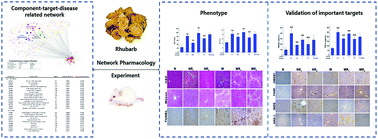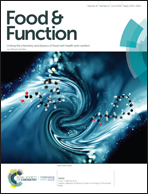Network pharmacology oriented study reveals inflammatory state-dependent dietary supplement hepatotoxicity responses in normal and diseased rats
Abstract
Rhubarb, a well-used herbal and dietary supplement, has been widely used as a laxative in many countries. The dietary supplement rhubarb may reveal differential hepatotoxicity responses in normal and diseased subjects; however, its underlying mechanism is unclear. By using a network pharmacology approach, we found that the components contained in rhubarb had associations with a liver disease-related protein network that could be enriched into two subnetworks: a pro-inflammatory protein network associated with liver inflammation and an anti-inflammatory protein network related to liver fibrosis. In addition, macrophages were found to have an association with these subnetworks. Herein, the differential toxicity responses of rhubarb in normal and diseased rats were illustrated by in vivo pharmacology experiments. Rhubarb induced liver injury in normal rats with dose-dependent increases in the pro-inflammatory response; in contrast, it failed to induce hepatotoxic effects in a liver fibrosis rat model and was accompanied by an increase in anti-inflammatory protein expression. Further study showed elevation of high mobility group box-1 (HMGB1) in the sera and liver tissues and remarkable pro-inflammatory activation of Kupffer cells in liver tissue; these phenomena were associated with the hepatotoxic effect of rhubarb and could be blocked by inhibiting either HMGB1 or Kupffer cells through glycyrrhizin or GdCl3, respectively. Interestingly, we also observed attenuated pro-inflammatory activation of Kupffer cells in a liver fibrosis rat model together with a non-hepatotoxic response to rhubarb. These results suggest that the divergent immune states in normal and diseased subjects may contribute to the differential toxicity responses to rhubarb.



 Please wait while we load your content...
Please wait while we load your content...